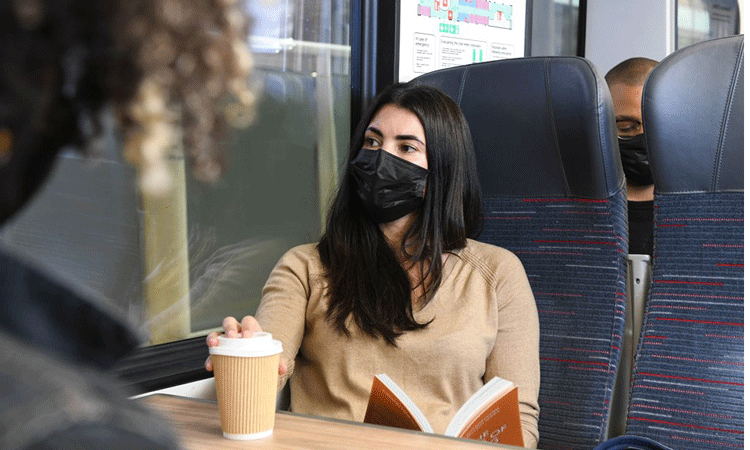Research unveils that commuting by rail improves passenger’s work ethic
Posted: 28 September 2021 | Global Railway Review | No comments yet
Academic research conducted by UCL Professors and the rail industry has revealed that commuting by rail significantly improves a passenger’s workday, including their productivity and wellbeing.


Credit: National Rail
The rail industry and UCL Professors have revealed that commuting by train and escaping the work from home routine can have a positive impact on cognitive performance, wellbeing, productivity and motivation.
It comes after last week saw seasonal and peak train journeys increase by 30 per cent since August 2021, with the industry’s latest research revealing over three quarters (77 per cent) of hybrid* workers are planning to return to their workplace.
WFH distractions affect our wellbeing
The research, which was conducted as part of the rail industry’s ‘Let’s get back on track’ campaign, found that improved mental health (48 per cent), work/life balance (46 per cent), productivity (46 per cent), motivation (47 per cent) and fitness levels (51 per cent) are some of the positive effects these workers are expecting to experience, as they head back to their workplace more regularly.
At the start of the COVID-19 pandemic, those who began working from home indulged in snacking more (50 per cent), working with the television on (33 per cent) or spending more time on social media (26 per cent). But now, nearly half of these workers from home say they now find these things a hinderance to productivity. In line with this, 43 per cent of hybrid workers admit to facing more distractions when working from home (WFH) compared to just 29 per cent in the workplace. The biggest distractions were cited as household admin (35 per cent), cooking meals and taking food breaks (30 per cent) and home deliveries (29 per cent).
When delving deeper into the neuroscience of train travel, UCL Professors Joseph Devlin and Daniel Richardson found that the distractions and additional tasks created, as a result of working from home, made it hard for people to focus, impaired their ability to learn and lowered their wellbeing.
Employees crave physical face time with colleagues
Conversely, 46 per cent of those polled agreed that the office environment puts them in better mindset for work, rising to 55 per cent of 18–34-year-olds. Respondents felt that they are likely to be more productive when in the workplace as they can ask colleagues in person rather than scheduling a call (45 per cent) and are able to bounce ideas off colleagues more easily (40 per cent).
As more commuters return to the office this week, over half of workers (55 per cent) feel that the biggest benefit of travelling by train is the scenery out of the window, and a further quarter (24 per cent) say the movement of the train brings a sense of calm. The neuroscientists confirmed that ‘the daily train commute has potential psychological benefits for both wellbeing and brain function’.
“The commute delineates boundaries between home and work-life and can be used to switch one off and transition to the other, which can have a positive impact on cognitive performance, wellbeing and productivity,” commented Prof Joseph Devlin from UCL. “Being able to escape the humdrum of the same environment gives your brain a wake-up call. Just going to work generates more diverse experiences than working from home, especially through interactions with other people. This greater novelty helps generate new memories, making each day more unique, sharpening recollection and reducing this ‘brain fog’ so commonly experienced during lockdown.”
The rail industry helps commuters to make the most of ‘me-time’
With nearly a quarter of hybrid workers citing ‘me time’ (23 per cent) as one of the biggest benefits of their commute, and wanting to help people make the most of their trip to the work place, the rail industry is offering commuters a range of exclusive discounts including: FutureLearn online courses, hot drinks and taste card memberships.
Seb Gordon, Director of External Communications for the Rail Delivery Group and spokesperson for the rail industry said: “We know the last 18 months have been really tough on people working from home. The latest research shows some of the challenges people have faced, from distractions and the formation of lockdown habits to the blurred lines between home life and work life.
“We’ve worked with the government to introduce the new Flexi Season ticket, giving commuters the freedom and flexibility to divide their time between home and the office, and are pleased to have a range of offers to help customers make the most of their ‘me time’ on the train and the days they commute.”
In addition to these great rewards for people who are commuting by train, the rail industry is helping people travel and book with confidence by providing: better journey information about busier trains and alternative routes, boosting cleaning, ensuring carriages are well ventilated and helping them change a booked journey fee free, should their circumstances change.
References
*Workers who have been working both from home and the office
OUT NOW: The Definitive Guide to Rail’s Digital Future
The rail industry is undergoing a digital revolution, and you need to be ready. We have released our latest market report, “Track Insight: Digitalisation.”
This is not just another report; it’s your comprehensive guide to understanding and leveraging the profound technological shifts reshaping our industry. We move beyond the buzzwords to show you the tangible realities of AI, IoT, and advanced data analytics in rail.
Discover how to:
- Optimise operations and maintenance with real-time insights.
- Enhance passenger services through seamless, high-speed connectivity.
- Leverage technologies like LEO satellites to improve safety and efficiency.
Featuring expert analysis from leaders at Nomad Digital, Lucchini RS, Bentley Systems and more, this is a must-read for any rail professional.
Related topics
Coronavirus/COVID-19, Passenger Experience/Satisfaction, Safety
Related organisations
FutureLearn, Rail Delivery Group (RDG), University College London (UCL)







